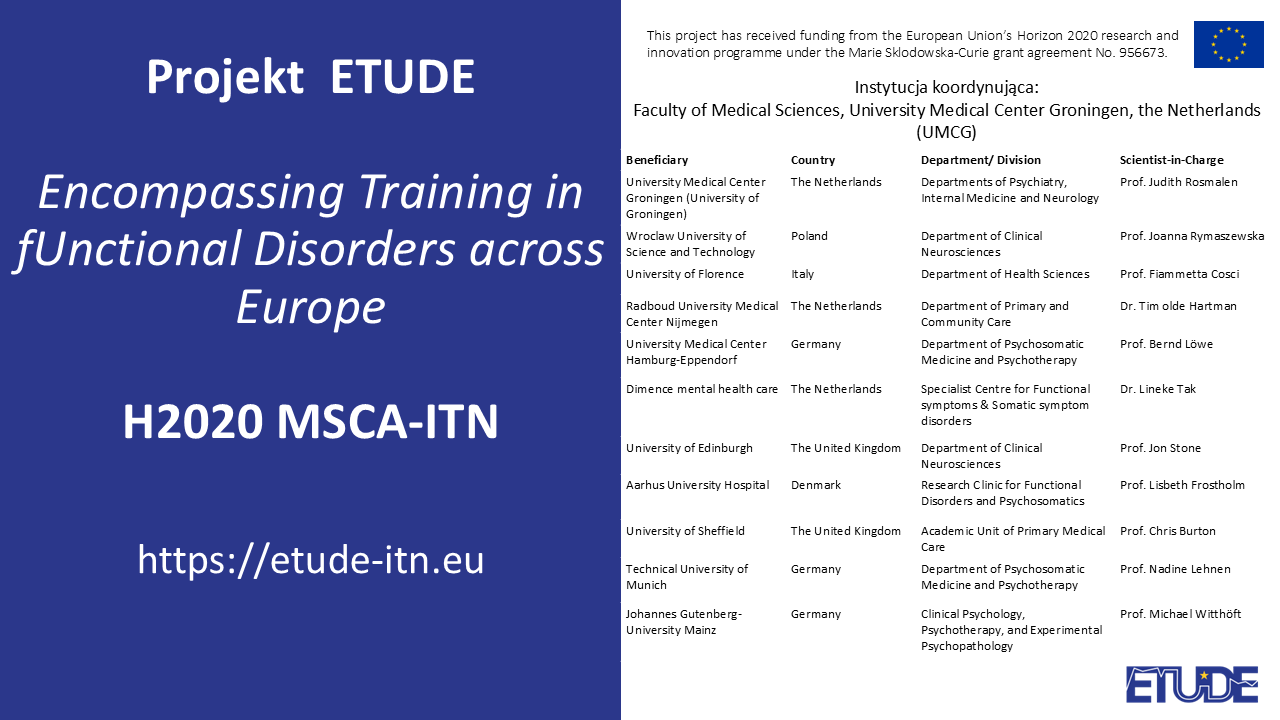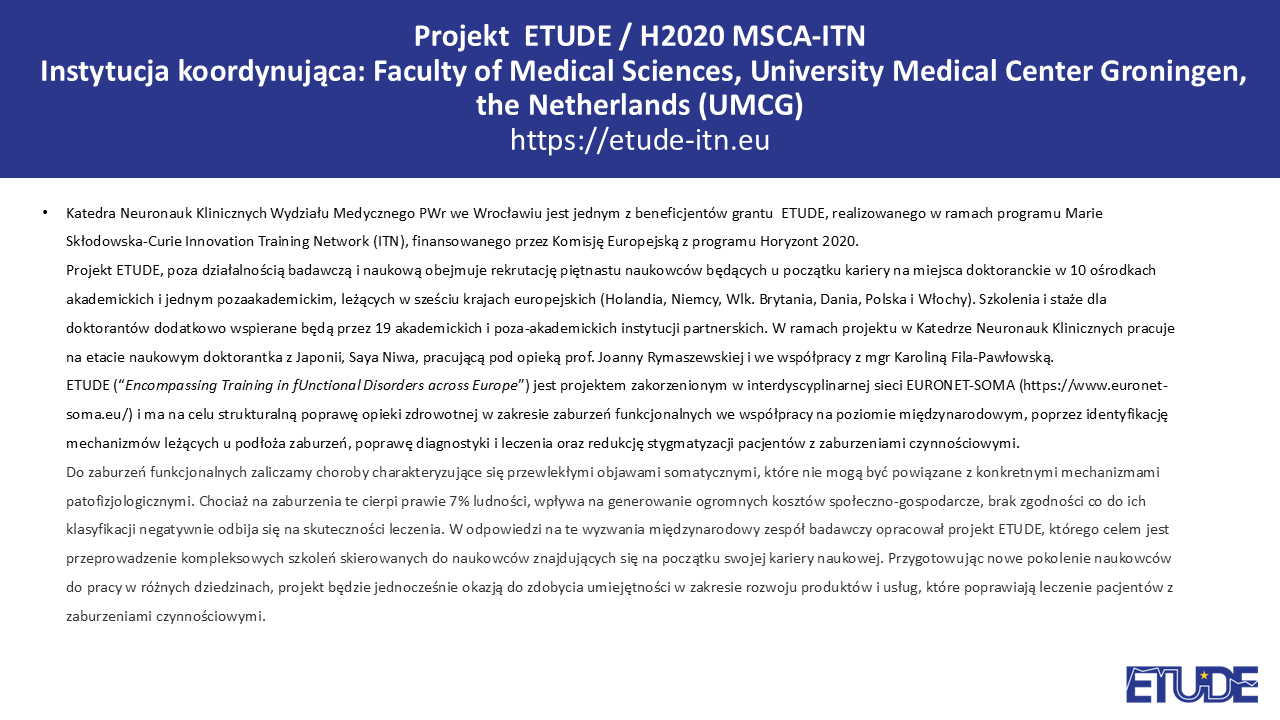Projekt ETUDE / H2020 MSCA-ITN / Instytucja koordynująca: Faculty of Medical
Sciences, University Medical Center Groningen, the Netherlands (UMCG)


Katedra Neuronauk Klinicznych Wydziału Medycznego PWr we Wrocławiu jest jednym z beneficjentów grantu ETUDE, realizowanego w ramach programu Marie Skłodowska-Curie Innovation Training Network (ITN), finansowanego przez Komisję Europejską z programu Horyzont 2020. Projekt ETUDE, poza działalnością badawczą i naukową obejmuje rekrutację piętnastu naukowców będących u początku kariery na miejsca doktoranckie w 10 ośrodkach akademickich i jednym pozaakademickim, leżących w sześciu krajach europejskich (Holandia, Niemcy, Wlk. Brytania, Dania, Polska i Włochy). Szkolenia i staże dla doktorantów dodatkowo wspierane będą przez 19 akademickich i poza-akademickich instytucji partnerskich. Jedno z miejsc doktoranckich utworzonych w ramach projektu znajduje się w Katedrze Neuronauk Klinicznych, która ma zaszczyt gościć doktorantkę z Japonii pracującą pod opieką prof. Joanny Rymaszewskiej i we współpracy z mgr Karoliną Fila-Pawłowską.
ETUDE (“Encompassing Training in fUnctional Disorders across Europe”) jest projektem zakorzenionym w interdyscyplinarnej sieci EURONET-SOMA (https://www.euronet-soma.eu/) i ma na celu strukturalną poprawę opieki zdrowotnej w zakresie zaburzeń funkcjonalnych we współpracy na poziomie międzynarodowym, poprzez identyfikację mechanizmów leżących u podłoża zaburzeń, poprawę diagnostyki i leczenia oraz redukcję stygmatyzacji pacjentów z zaburzeniami czynnościowymi. Do zaburzeń funkcjonalnych zaliczamy choroby charakteryzujące się przewlekłymi objawami somatycznymi, które nie mogą być powiązane z konkretnymi mechanizmami patofizjologicznymi. Chociaż na zaburzenia te cierpi prawie 7% ludności, wpływa na generowanie ogromnych kosztów społeczno-gospodarcze, brak zgodności co do ich klasyfikacji negatywnie odbija się na skuteczności leczenia. W odpowiedzi na te wyzwania międzynarodowy zespół badawczy opracował projekt ETUDE, którego celem jest przeprowadzenie kompleksowych szkoleń skierowanych do naukowców znajdujących się na początku swojej kariery naukowej. Przygotowując nowe pokolenie naukowców do pracy w różnych dziedzinach, projekt będzie jednocześnie okazją do zdobycia umiejętności w zakresie rozwoju produktów i usług, które poprawiają leczenie pacjentów z zaburzeniami czynnościowymi.
The ETUDE (Encompassing Training in fUnctional Disorders across Europe) project, funded by the EU’s Horizon 2020 program (Marie Skłodowska-Curie Innovative Training Network) , aimed to address the challenges associated with diagnosing and treating functional disorders—conditions seen across medical disciplines, characterised persistent somatic symptoms (PSS) that lack clear pathophysiological explanations. The EURONET-SOMA network identified key issues in the field, including fragmented diagnostic practices, insufficient training, and a lack of research. In response, an interdisciplinary European training network was created with 15 PhD students conducting collaborative and multidisciplinary research across four work packages: understanding mechanisms, improving diagnosis, enhancing treatment, and addressing stigma. Through a combination of local courses, secondments, and network-wide training schools, the project developed innovative diagnostic methods, treatment recommendations, and strategies to reduce stigma, ultimately aiming to improve care for patients with functional disorders across Europe.
Our research team at Wroclaw University of Science and Technology is led by Principal Investigators Prof. Joanna Rymaszewska and Karolina Fila-Pawlowska Mgr, with Saya Niwa Mgr, a PhD student, contributing through the ETUDE programme. Our project aimed to investigate dysfunctional breathing patterns as a potential transdiagnostic mechanism underlying FD, with the broader objective of developing innovative diagnostic tools and treatment approaches based on breathing mechanisms.
As an initial step in our project, we conducted a systematic review of the existing literature on respiratory function in patients with PSS compared to healthy controls (Niwa et al., 2024). Our findings revealed that while patients with PSS exhibited some objective respiratory abnormalities, their subjective respiratory symptoms were more pronounced. A notable dissociation between reported symptoms and objective respiratory measures was frequently observed in patients, but not in controls. Additionally, most studies reviewed had focused on either subjective or objective respiratory parameters in isolation, with few investigating both. To bridge this gap, we conducted two further studies that examined both subjective and objective respiratory function, alongside autonomic reactivity, using a standardized respiratory challenge.
The primary aim of the first case-control study was to investigate both objective and subjective respiratory outcomes in patients with PSS compared to healthy controls, and describe the occurrence, features, and possible risk factors for the development of dysregulated breathing in PSS. 35 patients with PSS (screened by a clinician and member of the research team) and 35 well-matched healthy controls were recruited for the study. The results of this study suggest that in patients with PSS, accessory respiratory muscles and breathing-related movements may be dysfunctional, with an over-reliance on thoracic/chest breathing. Perception of breathlessness and functional respiratory complaints were significantly more pronounced in patients with PSS. Subjective respiratory outcomes showed a weak correlation with objective pulmonary function in both patients and controls. However, in controls, functional respiratory complaints were linked to dyspnea, and lower baseline EtCO2 levels predicted higher functional respiratory complaints.
Our second case-control study investigated autonomic reactivity and end-tidal CO2 (EtCO2) levels in patients with PSS. The study hypothesized that patients with PSS would exhibit lower resting levels of etCO2, more pronounced subjective experiences of dyspnea and dysregulated breathing, and longer recovery times to baseline EtCO2 after a respiratory challenge compared to controls. The findings of this study suggest that lower baseline EtCO2 levels and those measured immediately after a respiratory challenge may point to variations in autonomic responses and the presence of chronic hyperventilation in PSS patients. However, despite these observed differences, the rate of EtCO2 change over time during baseline and recovery was comparable between patients and controls, which contrasts with earlier studies. Additionally, lower baseline EtCO2 levels were linked to increased functional respiratory complaints in the control group, but not in PSS patients, consistent with previous research highlighting higher overall symptom reporting among individuals with PSS.
A further study was designed to test the feasibility of a Virtual Reality (VR) biofeedback breathing game to train diaphragmatic breathing in an engaging and immersive environment. Explore DEEP is a biofeedback game designed to provide players with an engaging training environment where they can learn to re-learn healthy breathing patterns. Within the game, expansion and contraction of players’ diaphragm is measured by a specialised controller belt which influences players up- and forward movement in the game. This way of controlling the game encourages players to use diaphragmatic breathing; an evidence-based anxiety and stress regulation technique. Additionally, several mirroring visualisations help players become more aware of their breathing. 48 participants (24 healthy controls and 24 patients with PSS) took part in the study and were randomly allocated to active or sham experimental conditions. Participants in the active condition received three sessions of the DEEP VR game guided by a member of the research team. Participants completed measures of functional respiratory complaints and dyspnea at baseline and following the last session of DEEP VR (or 3 weeks after their initial baseline measures for participants in the sham condition). The results of this study offer initial evidence supporting the feasibility of using the DEEP VR game to retrain diaphragmatic breathing and alleviate respiratory complaints and dyspnea. The findings suggest that the game may affect symptom reporting in healthy controls, possibly due to improvements in breathing mechanics. However, since the controls had low baseline levels of dyspnea, its impact on dyspnea outcomes may be minimal. In patients, although reports of functional respiratory symptoms remained high, changes in dyspnea scores suggest potential shifts in subjective breathlessness and perceptions of breathing. As this was a feasibility study, we did not assess the DEEP VR game's effectiveness in reducing PSS symptoms. Future research will explore its therapeutic potential in addressing symptoms potentially linked to dysfunctional breathing in patients with PSS and FD.
The findings from our project indicate potential disturbances in the respiratory system among patients with PSS, likely driven by a combination of autonomic dysregulation and biomechanical, biochemical, and psychophysiological alterations in breathing. Patients with PSS consistently report higher levels of symptom perception, particularly dyspnea and symptoms associated with hyperventilation and irregular breathing patterns, irrespective of their primary symptoms or syndrome. These heightened symptom reports suggest that dysfunctional breathing may be a common underlying factor in PSS, further complicating symptom management and quality of life. In future, diagnostic and therapeutic approaches that focus on retraining optimal breathing mechanics, rebalancing and habituating the autonomic nervous system, and addressing maladaptive beliefs about breathlessness may prove beneficial for this patient population.
For more details about the project, please refer to the following: